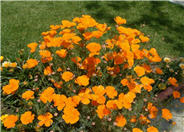
Common name:California Poppy, Golden Poppy
Botanical name:Eschscholzia californica
This small annual (sometimes acts as a perennial) plant will grow to less than 1' tall and has light, small blue/green leaves with gold and orange flowers that bloom in spring and summer.
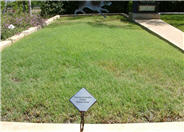
Common name:Buffalo Grass
Botanical name:Buchloe dactyloides
Native American grass, can make a low water lawn, little maintenance needed. Slow to establish, a little summer water can look quite nice. Winter brown. Full Sun. Only grows 4-8". Early green up in spring. Soft textured. This perennial shortgrass grows 2-5" high and 6-12' wide. The rouded, hollow stems have gray/green curly leaves that are 1/10" wide and 2" long. This grass is very drought-resistant and turns tan in winter and lavender in autumn.
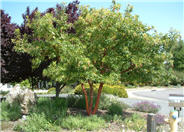
Common name:Strawberry Madrone, Marina Strawber
Botanical name:Arbutus 'Marina'
The 'Marina' has gorgeous bark, with leaves that are smaller and not as glossy as Pacific Madrone. Its flowers are pink, borne in pendant clusters in the summer. The fruit is large, red and quite ornamental. The plant should be grown in sun to part shade, with little or no summer watering when established. The 'Marina' prefers good drainage. -Monterey Bay Nursery
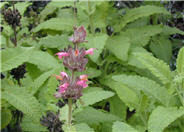
Common name:Hummingbird Sage, Pitcher Sage
Botanical name:Salvia spathacea
The extravagant leaves of this small clumping sage emit a perfectly sweet fragrance, which attracts hummingbirds. In the spring, the red/pink flowering spikes become a deep fuchsia. It is a great plant for dry shade.
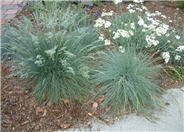
Common name:Common Blue Fescue, Blue Fescuegras
Botanical name:Festuca glauca
This groundcover/grass will grow less than 1' tall and has small, blue-green leaves.
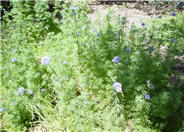
Common name:Globe Gilia
Botanical name:Gilia capitata
Globe Gilia is an annual. Grows 8-30 in. tall, to 8 in. wide. Pale blue to violet-blue flowers with blue pollen are carried in dense, 1/2 -1.5 in. wide clusters that look like pincushions. Generally blooms in spring through summer.
| Designer: 6500 Soquel Drive, Aptos | Cabrillo College Horticulture Department |
Photographer: GardenSoft |
Soils and Compost:
Incorporate compost 6" into your soil to retain water, reduce compaction, feed earthworms, and provide valuable nutrients to your plants.
Water Saving Tip:
Irrigate early in the morning and/or late in the evening to reduce water loss due to evaporation and wind drift.
Integrated Pest Management:
Drip and other smart irrigation delivers water directly to roots, allowing no excess water for weeds.
